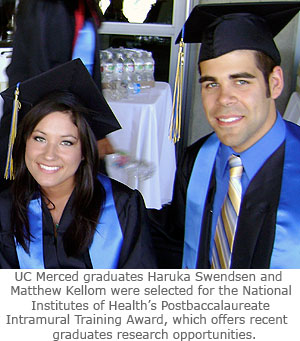

Well before they graduated last spring with bachelor’s degrees from UC Merced, Haruka Swendsen and Matthew Kellom had a career plan.
The two knew they would apply to
graduateschool. But first, they wanted gain more research experience. Both worked successfully with UC Merced professors in their laboratories and gained valuable hands-on experience. Seeking additional research opportunities would prove even more beneficial.
The
biological sciencesgraduates applied for the National Institutes of Health’s Postbaccalaureate Intramural Training Award (ITRA) program. Both were selected.
The ITRA provides opportunities for recent college graduates planning to attend graduate or medical school to spend up to two years engaged in biomedical research at the NIH. Trainees work directly with some of the world’s leading scientists in an environment devoted exclusively to biomedical research. According to the NIH, the IRTA program is highly competitive. Less than 10 percent of applicants were selected in the past year.
Kellom, from Livermore, will spend the next two years working in the National Institute on Aging’s brain physiology and metabolism section. The lab in which he is working focuses on brain disorders such as bipolar disorder, schizophrenia and Alzheimer’s disease.
He is currently working on two projects. One studies the effects of mood-stabilizers on rats deprived of omega-3 fatty acid for the development of an animal model for bipolar disorder. The other identifies chronic effects of central nervous drugs on the arachidonic acid cascade in the rat brain as a model for humans.
Swendsen, of El Cerrito, was already familiar with working for the NIH. She interned there in summer 2008, researching migraine, stroke and mood disorders. She applied specifically to the ITRA program because of its prominence.
“It is one of the most competitive internship programs out there that gives you research and clinical experience,” she said.
Swendsen’s research examines migraines and their connection with mood and anxiety disorders.
“Right now, there is limited research on the endophenotypes that may be associated with mood and anxiety disorders,” she said. “The lab I work in examines families with these disorders to determine if there is an underlying genetic component.”
Swendsen and Kellom, who started their positions in June, said they believe their academic and research experiences at UC Merced helped strengthen their applications.
Kellom worked in the lab of
School of Natural Sciencesassistant professor
Mónica Medinaduring his junior and senior years. “I did a lot of work with proteins in her lab,” he said. His voice can be heard narrating some of the
environmental podcastsproduced by Medina’s lab.
“I was able to work independently and that made me more confident to work in a lab setting,” he said.
Swendsen agreed.
“UC Merced helped prepare me for this in every way, especially the fact that research opportunities are available to
undergraduatestudents,” she said.
For three years, Swendsen worked as a research assistant and lab manager for
School of Social Sciences, Humanities and Artsprofessor
Evan Heit. Her research focused on memory and reasoning.
“Working individually with Dr. Heit has contributed to my scientific understanding and helped to prepare me for the work I am doing now,” she said. “And because of UC Merced’s strong curriculum, I feel equipped to work with researches that are well established in their field.”
Swendsen plans to apply to a combined medical and doctoral program after completing the ITRA. Kellom’s future plans include applying to graduate school to study astrobiology.






